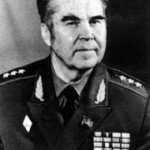Nationality: Russian
Lived: 1928-1995
Profession: Military officer, defence advisor, writer and historian
Books: Stalin: Triumph and Tragedy (1988); Lenin: A new biography (1994); Trotsky: The Eternal Revolutionary (1996)
Perspective: Soviet-revisionist or ‘Soviet-liberal’.
Synopsis
Dmitri Volkogonov began his career as a high-ranking Soviet military officer specialising in psychological warfare. Towards the end of his service, he turned his hand to researching and writing history. Once loyal to Soviet communism and its leaders, Volkogonov’s views shifted over time. In the 1970s he penned a remarkably daring biography of Joseph Stalin, condemning him as a leader, a military commander and as a human being. Though Volkogonov’s writings echoed the Khrushchev line – that Stalinism was an aberration, a perversion of Lenin’s true legacy – he also hinted at more fundamental problems in the Soviet state. Volkogonov’s controversial manuscripts remained unpublished for years until the rise of Gorbachev and glasnost in 1988. Once released they rendered Volkogonov unpopular, particularly with his military employers who released him from service. Volkogonov continued delving into once-closed Kremlin archives, penning histories that picked at the short-comings of Soviet leaders – even icons like Trotsky and Lenin. His works were eventually translated by Harold Shukman and released in the west. Interviewed shortly before his death, Volkogonov noted that “history has literally led me to a complete denial of all that I had been praying for my whole life … I feel very happy that by the end of my life I’ve freed myself from this horrible nightmare, this primitivism.”
Quotations
“The famine … was appalling. People were eating dead bodies, although the Politburo banned any mention of cannibalism in the press. On 23 February 1922, the public learned from their newspapers that a government decree had been issued on the forcible confiscation of all valuables from Russian churches. It was not stated that this decree had first been personally approved by Lenin.”
“In 1938 … many of Trotsky’s intellectual friends began asking themselves at what point and from what source the Stalinist terror and the violent, anti-democratic character of the Soviet regime had originated. For [some] the rot had begun with the crushing of the Kronstadt revolt in March 1921. They now publicly raised the question of Trotsky’s personal responsibility. One declared unequivocally that this use of force against those who thought differently from the Bolsheviks had signalled a shift to repressive policies in the Soviet republic while Lenin and Trotsky were still in power. Had Trotsky not led the punitive expedition himself? In what way was he superior to Stalin?”

